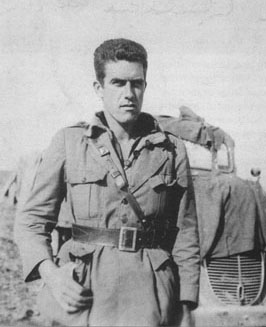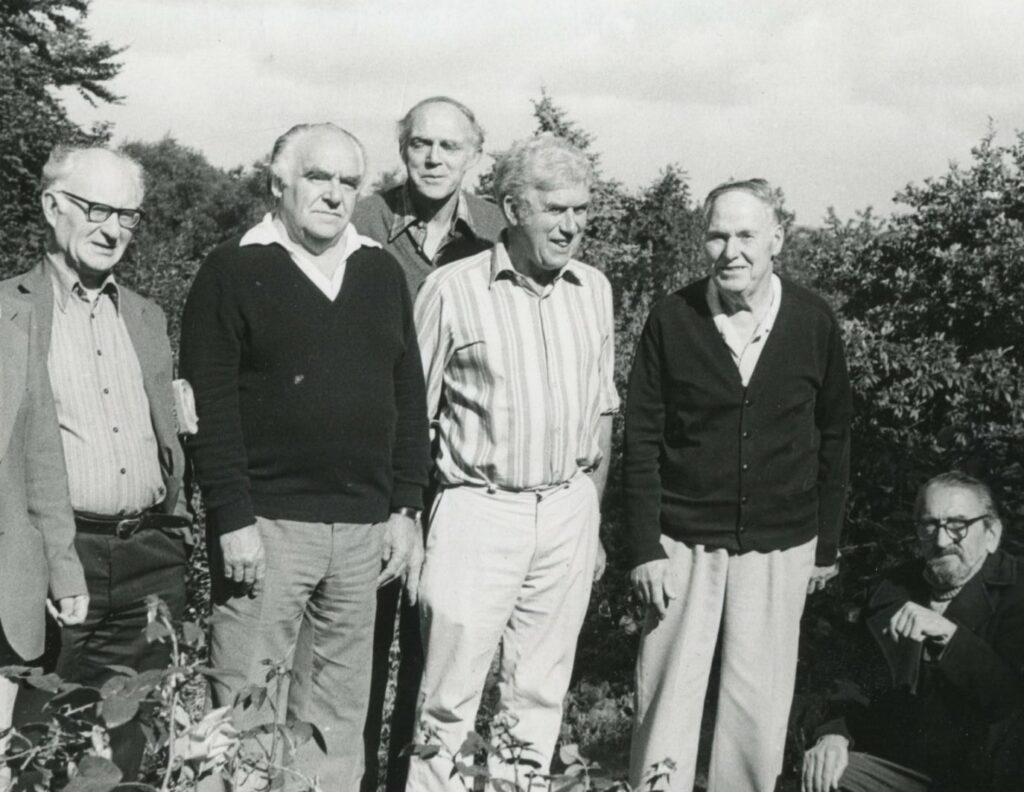International Brigade Memorial Trust
In August 2021 the Sandhurst Trust published, via their Facebook page, a celebration of Bill Alexander (1910-2000), who served as a commander of the British Battalion and a Sandhurst alumnus. The IBMT acknowledges the post as a welcome surprise as the International Brigades and their service in Spain are virtually never recognised by the armed forces establishment in Britain.
A profile of Bill Alexander is provided below, based on an edited version of his obituary written by IBMT Historical Consultant Richard Baxell and published in the The Guardian in July 2000.

Bill Alexander was born in Hampshire, one of seven children of a rural carpenter. Despite a poor upbringing, education was encouraged in his family and, like most of his siblings, Bill went to university, studying chemistry at Reading.
Influenced by his mother's free-thinking philosophy – and the sight of hunger marchers – he joined the Communist Party of Great Britain in 1932. He found work as an industrial chemist, where, unwilling to be seen as ‘management’, he repeatedly turned down offers of promotion – devoting his efforts, instead, to the Print Workers' Union and the Party. He also took part in the battle of Cable Street, which prevented Oswald Mosley's British Union of Fascists from marching through the East End of London.
In July 1936 came the Spanish Civil War, an event that was to have a profound and lasting impact on Bill. Angered by the British government's duplicitous policy of non-intervention – Whitehall turned a blind eye to the huge levels of material support given to Franco by fascist Italy and Nazi Germany – he volunteered for the International Brigades in the spring of 1937. Arriving in Spain soon after the murderous battle of Jarama, in which two-thirds of the British Battalion were killed or wounded, he joined the newly-formed Anti-Tank Battery, which was equipped with modern, high-velocity Soviet guns.
Described by a comrade as ‘a strict disciplinarian, but fearless’, Bill soon showed that his military efficiency matched his political resolve, and was appointed the battery's political commissar. This was a position of great responsibility and equal danger, for, in addition to being expected to lead from the front, political commissars were invariably executed if captured. Bill was cited for bravery at the battle at Belchite in September 1937; four months later, at Teruel in January 1938, he was promoted to captain and commander of the British Battalion. The following month he was injured in the chest and shoulder by a bullet, adding another injury to the loss of hearing in his left ear, which had been caused by standing too close to one of the anti-tank guns. He was invalided home at the end of June 1938.
Back in Britain, Bill continued to campaign for the Spanish Republic, and was involved in numerous demonstrations outside the Spanish embassy. He also became Merseyside area secretary of the Communist Party, which he remained until the outbreak of the Second World War.
In 1940 he was recommended by the ‘red’ Duchess of Atholl for a commission at Sandhurst, where he finished top of his year. He served in North Africa, Italy and Germany, rising to the rank of captain in the reconnaissance corps, even though the promotion board made it clear they knew his history and political background. Many of his comrades from Spain were not so fortunate and suffered persistent discrimination.
After the war Bill resumed his political activities in Britain, and, in addition to becoming Coventry secretary of the Communist party, stood unsuccessfully against Richard Crossman at Coventry East in the 1945 general election. From 1947-53, he was party secretary for the Midlands area, and, following a six-year period as secretary for Wales, became assistant general secretary of the party in 1959, a position he held until 1967. He later taught chemistry in south-east London until retirement.

He was present in October 1985 at the unveiling of the International Brigade memorial on London’s South Bank, which continues to be the site of the IBMT’s annual commemoration event. The establishment of International Brigade memorials across Britain owes much to the efforts of Bill in his role as Secretary of the International Brigade Association, a position he held for more than 30 years.
Between 1989-96 Bill was president of the Marx Memorial library in Clerkenwell, London, to which he became a frequent and well-known visitor. The library holds the International Brigade Archive, where Bill researched a number of works on the international brigades, including the official history of the volunteers from Britain and Ireland, ‘British Volunteers For Liberty’ (1982), ‘No To Franco’ (1992) and, with others, ‘Memorials Of The Spanish Civil War’ (1996).
He also wrote articles and letters challenging what he felt to be the mythology of the Spanish Civil War. He was always strongly critical of the perception of the Spanish war as ‘the poets' war’ and condemned Ken Loach's 1995 film ‘Land And Freedom’. He accused it – with some justification – of presenting a narrow and partisan view of the war that exaggerated the role of the British volunteers with the POUM (the Workers' Party of Marxist Unification) at the expense of the International Brigaders, of whom he was justifiably proud. He once said: ‘I regard everyone who went there as a hero or heroine.’ In that view, he was not alone.
For many years Bill was tireless in his efforts for the International Brigade Association, which he ruled with a rod of iron. He represented the organisation at numerous events and led a group of surviving volunteers and their families on an emotional journey to Spain in 1986 to revisit the sites of the British volunteers' exploits. The visit was filmed by the BBC for a television documentary, ‘A Return To The Battlefields’. Bill regularly gave impassioned talks about the Spanish ‘anti-fascist war’ and what he felt to be its lessons; the importance of ‘strength and unity’. He always turned up with numerous pamphlets and books in aid of the International Brigade Association, which he would promote with unabashed alacrity.
Bill Alexander died as he lived, a deeply committed volunteer for liberty.
Posted on 31 December 2022.
